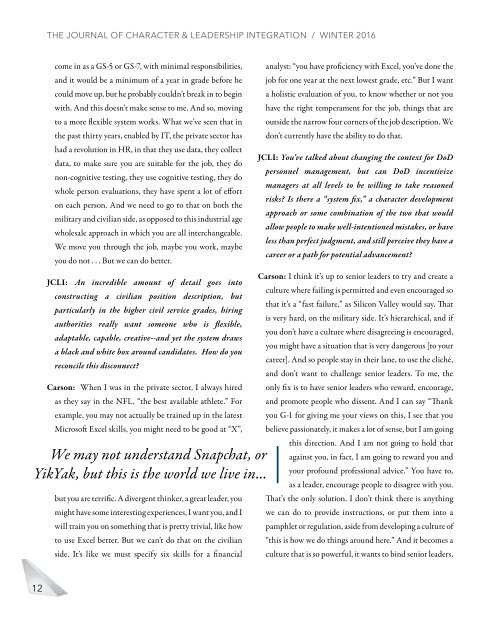PROFESSION OF ARMS
Yi5mwL
Yi5mwL
Create successful ePaper yourself
Turn your PDF publications into a flip-book with our unique Google optimized e-Paper software.
THE JOURNAL <strong>OF</strong> CHARACTER & LEADERSHIP INTEGRATION / WINTER 2016<br />
come in as a GS-5 or GS-7, with minimal responsibilities,<br />
and it would be a minimum of a year in grade before he<br />
could move up, but he probably couldn’t break in to begin<br />
with. And this doesn’t make sense to me. And so, moving<br />
to a more flexible system works. What we’ve seen that in<br />
the past thirty years, enabled by IT, the private sector has<br />
had a revolution in HR, in that they use data, they collect<br />
data, to make sure you are suitable for the job, they do<br />
non-cognitive testing, they use cognitive testing, they do<br />
whole person evaluations, they have spent a lot of effort<br />
on each person. And we need to go to that on both the<br />
military and civilian side, as opposed to this industrial age<br />
wholesale approach in which you are all interchangeable.<br />
We move you through the job, maybe you work, maybe<br />
you do not . . . But we can do better.<br />
JCLI: An incredible amount of detail goes into<br />
constructing a civilian position description, but<br />
particularly in the higher civil service grades, hiring<br />
authorities really want someone who is flexible,<br />
adaptable, capable, creative--and yet the system draws<br />
a black and white box around candidates. How do you<br />
reconcile this disconnect?<br />
Carson: When I was in the private sector, I always hired<br />
as they say in the NFL, “the best available athlete.” For<br />
example, you may not actually be trained up in the latest<br />
Microsoft Excel skills, you might need to be good at “X”,<br />
We may not understand Snapchat, or<br />
YikYak, but this is the world we live in...<br />
but you are terrific. A divergent thinker, a great leader, you<br />
might have some interesting experiences, I want you, and I<br />
will train you on something that is pretty trivial, like how<br />
to use Excel better. But we can’t do that on the civilian<br />
side. It’s like we must specify six skills for a financial<br />
analyst: “you have proficiency with Excel, you’ve done the<br />
job for one year at the next lowest grade, etc.” But I want<br />
a holistic evaluation of you, to know whether or not you<br />
have the right temperament for the job, things that are<br />
outside the narrow four corners of the job description. We<br />
don’t currently have the ability to do that.<br />
JCLI: You’ve talked about changing the context for DoD<br />
personnel management, but can DoD incentivize<br />
managers at all levels to be willing to take reasoned<br />
risks? Is there a “system fix,” a character development<br />
approach or some combination of the two that would<br />
allow people to make well-intentioned mistakes, or have<br />
less than perfect judgment, and still perceive they have a<br />
career or a path for potential advancement?<br />
Carson: I think it’s up to senior leaders to try and create a<br />
culture where failing is permitted and even encouraged so<br />
that it’s a “fast failure,” as Silicon Valley would say. That<br />
is very hard, on the military side. It’s hierarchical, and if<br />
you don’t have a culture where disagreeing is encouraged,<br />
you might have a situation that is very dangerous [to your<br />
career]. And so people stay in their lane, to use the cliché,<br />
and don’t want to challenge senior leaders. To me, the<br />
only fix is to have senior leaders who reward, encourage,<br />
and promote people who dissent. And I can say “Thank<br />
you G-1 for giving me your views on this, I see that you<br />
believe passionately, it makes a lot of sense, but I am going<br />
this direction. And I am not going to hold that<br />
against you, in fact, I am going to reward you and<br />
your profound professional advice.” You have to,<br />
as a leader, encourage people to disagree with you.<br />
That’s the only solution. I don’t think there is anything<br />
we can do to provide instructions, or put them into a<br />
pamphlet or regulation, aside from developing a culture of<br />
“this is how we do things around here.” And it becomes a<br />
culture that is so powerful, it wants to bind senior leaders,<br />
12


